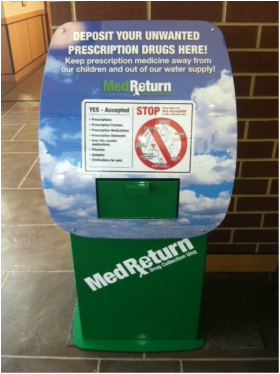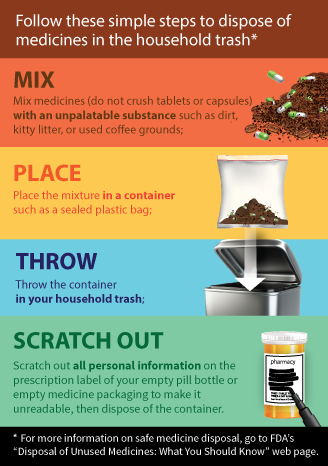Expired Medications - What You Need to Know |
Download a printable version of this page to share with friends and family |
It’s a common problem. You have a headache and reach for a bottle of aspirin only to discover that, according to the label, it “expired” six months ago. Do you take it or drive to the drugstore for a fresh batch? There isn’t a lot of information on medication packaging about just what “expired” means or what the risks, if any, are of taking medications that are past their expiration date. Read on to learn all you need to know about expired meds.
What Expiration Dates Mean
According to Ilisa Bernstein, the deputy director of the Office of Compliance in the FDA’s Center for Drug Evaluation and Research, “The medicine expiration date is a critical part of deciding if the product is safe to use and will work as intended. Once the expiration date has passed there is no guarantee that the medicine will be safe and effective.” (Read the entire statement). The bottom line - the fact that a drug expiration date has passed doesn’t mean that the drug is no longer safe and effective, it means that that manufacturer no longer guarantees that it is safe and effective.
In fact, many experts believe that drugs degrade very slowly and that package expiration dates represent a conservative view of when drugs should be discarded. In 2006, the Journal of Pharmaceutical Sciences published the results of a multi-year study of 122 drugs that had been used in the Department of Defense over the prior twenty years. On one hand, the study found that almost 90% of the drugs were stable for more than one year past their expiration date, with many drugs remaining stable for several years. On the other hand, stability varied considerably from drug to drug, and sometimes even across different batches of the same drug. It is also important to note that drugs maintained by the Department of Defense are stored in climate-controlled, regulated areas much different than your bathroom cabinet or car glove compartment. A 2012 study published in the Journal of the American Medical Association reached a similar conclusion, finding that most drugs remained potent far beyond their expiration date.
What Expiration Dates Mean
According to Ilisa Bernstein, the deputy director of the Office of Compliance in the FDA’s Center for Drug Evaluation and Research, “The medicine expiration date is a critical part of deciding if the product is safe to use and will work as intended. Once the expiration date has passed there is no guarantee that the medicine will be safe and effective.” (Read the entire statement). The bottom line - the fact that a drug expiration date has passed doesn’t mean that the drug is no longer safe and effective, it means that that manufacturer no longer guarantees that it is safe and effective.
In fact, many experts believe that drugs degrade very slowly and that package expiration dates represent a conservative view of when drugs should be discarded. In 2006, the Journal of Pharmaceutical Sciences published the results of a multi-year study of 122 drugs that had been used in the Department of Defense over the prior twenty years. On one hand, the study found that almost 90% of the drugs were stable for more than one year past their expiration date, with many drugs remaining stable for several years. On the other hand, stability varied considerably from drug to drug, and sometimes even across different batches of the same drug. It is also important to note that drugs maintained by the Department of Defense are stored in climate-controlled, regulated areas much different than your bathroom cabinet or car glove compartment. A 2012 study published in the Journal of the American Medical Association reached a similar conclusion, finding that most drugs remained potent far beyond their expiration date.
|
Learn More - Watch "Expiration Dates Matter," a video by the Food and Drug Administration that summarizes the FDA position on expired medications.
|
Key Points
With so many different drugs maintained in so many different forms, it’s difficult to generalize about whether it is advisable to take drugs beyond their expiration dates. Here are a few rules of thumb:
With so many different drugs maintained in so many different forms, it’s difficult to generalize about whether it is advisable to take drugs beyond their expiration dates. Here are a few rules of thumb:
- If any of the drugs you are taking can mean the difference between life and death (for example, nitroglycerin, insulin or EpiPens), do not take chances by relying on expired medications. Keep them up to date.
- Drugs in liquid suspensions or drugs that need to be refrigerated go bad relatively quickly and should always be kept up to date
- If you have a cold, headache, allergies or back pain and all you have at home are medicines that expired within the last year or two, there is probably no harm in taking them, although there is a small chance that they will have lost some of their potency
- While the biggest problem from taking most expired drugs is that they may not be as effective, there is some evidence that taking expired Tetracycline may actually be harmful
- Use common sense. If a drug has a strong smell or it is an ointment that comes out crystallized, don’t use it
- Store drugs wisely. That generally means tightly closed, in a cool, dry place away from direct sunlight (and always in their original container to avoid taking the wrong drug by mistake). And it goes without saying that drugs should always be stored out of the reach of children or pets.
- If you have any questions about taking expired drugs, ask Dr. Pierce or Dr. Afrookteh
Disposing of Expired Medications
OK, so you’ve made the decision never to use that five year old bottle of pills in your closet. What should you do with them?
Whatever you do, don’t just leave them there. Drugs that languish in home medicine cabinets are susceptible to misuse, either intentional or inadvertent. More than 7 million Americans currently abuse prescription drugs and according to the Partnership for a Drug-Free America, about 2,500 teens a day use prescription drugs to get high for the first time.
OK, so you’ve made the decision never to use that five year old bottle of pills in your closet. What should you do with them?
Whatever you do, don’t just leave them there. Drugs that languish in home medicine cabinets are susceptible to misuse, either intentional or inadvertent. More than 7 million Americans currently abuse prescription drugs and according to the Partnership for a Drug-Free America, about 2,500 teens a day use prescription drugs to get high for the first time.
|
There are at least two ways to dispose of drugs properly.
Frederick County Drug Take Back Program Probably the easiest way to dispose of unneeded medicaitons is to take advantage of Frederick County’s Drug Take Back program. Through a collaborative effort between the Frederick County Health Department and local law enforcement agencies, you can deposit unwanted drugs in one of the MedReturn boxes at any of the following locations: Frederick County Police Department 100 West Patrick Street Frederick, MD 21701 Maryland State Police Barracks 110 Airport Drive East Frederick, MD 21701 Middletown Municipal Center 31 W Main Street Middletown, MD 21769 There are additional locations in Thurmont, Brunswick and Emmitsburg. You can learn more about the program at the Frederick County website. |
|
If you choose to dispose of drugs at home, the FDA recommends that you follow four steps:
|



